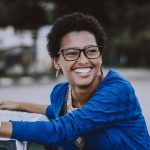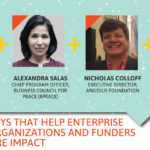Applications are currently being accepted for the SOCAP18 Bush Foundation Scholarship for Social Business Creators, open to people based in Minnesota, North Dakota, South Dakota, and the 23 Native nations that share the same geography who are creating social change through business. This is the second year in a row that the Bush Foundation, an organization that works to encourage individuals and organizations to think bigger and differently about what is possible in communities across the midwest, will bring 25 selected entrepreneurs to San Francisco to attend SOCAP.
Recently, we sat down with Bilal Alkatout, the Community Innovation Program Manager at the Bush Foundation, to talk about the results they saw from last year’s scholarship and the impact they aim to create this year.
This year and last year, you made sure to open the scholarship to a wide variety of people within the social business ecosystem, not only people who call themselves entrepreneurs. Can you give examples of the varying roles among the pool of selected scholarship recipients from last year’s cohort?
Yes, but it is worth leading with a little context. The Bush Foundation is interested in supporting the social business ecosystem in our region as a whole. Our Social Business Venture strategy points to business creators and growers and investors as two major pillars of the ecosystem. Another part of the ecosystem is ensuring that these two pieces are as interconnected as possible to make sure they are working collaboratively and with as few barriers as possible. The Social Business Venture strategy makes investments that: 1) Inspire, equip and connect people of all backgrounds to create and grow more successful social purpose businesses; 2) Inspire, equip, and connect people of all backgrounds to invest more capital in the creation and growth of social purpose businesses and, 3) Create a supportive ecosystem for business creators and growers and investors in social purpose business.
We try to use language that is broader than ‘entrepreneur’ because research shows that many business owners, particularly underrepresented business creators and growers, do not use the term entrepreneur to describe themselves.
We use the terms “business creators” and “growers” because they are the thought leaders, entrepreneurs, and ideators that are starting businesses. We try to use language that is broader than ‘entrepreneur’ because research shows that many business owners, particularly underrepresented business creators and growers, do not use the term entrepreneur to describe themselves.
So, what does that look like for attendees? Last year we were really excited to see at least half of the scholars were business creators and growers. We also had leaders that are guiding B Corp regulations and policies in our region. One individual mentioned deep appreciation for the ability to connect with other leaders from around the world that were similarly starting or maintaining an accelerator for social business starters and growers. Further, there were regional funders and business coalition leaders that attended. Overall, it was an exciting group of leaders interested in learning, sharing, and driving social business values into the private sector in our region and beyond.
Your partnership with SOCAP was in part intended to build social business problem solving capacity in your region of MN, ND, SD and the 23 Native nations that share the geography. What impacts have you already seen?
Our region is ripe for innovation as it stands with a number of highly rated business schools, Fortune 500 corporations, and thought leaders. The Twin Cities ranked eighth in the Halcyon Annual Ranking of Best Cities for Social Entrepreneurs in 2017. The Bush Foundation has seen some positive changes that indicate a shift toward problem-solving throughout our work. Specific to Social Business, it is a bit early to declare that our investments have had a particular impact, but we do recognize one clear shift in positive attention. As our leaders are attending national and international conferences, and encouraged to think bigger and differently, they are starting to recognize themselves as innovators and leaders in the field. The midwest has generally not been seen as an innovative space in our country but we are increasingly seeing folks from our region recognizing that they are thought leaders, and the rest of the country tuning in to what we are doing and asking for insight. I’m biased, but I think we are doing some really neat stuff.
What sorts of collaborations have resulted from connecting leaders in Minnesota, North Dakota, South Dakota, and the 23 Native nations that share the same geography with members of the national and global impact community at SOCAP?
I’ve seen a lot of connections and co-learning happening between our region and other national players. One example is an entrepreneur connecting to a national funder as an early stage investor. Some of our social business leaders that are starting accelerators, coalitions of social business creators, and investors are interacting with folks at a national level that are trying to work with, and are similar to, some of the attendees they met in the first SOCAP cohort. I am sure similar connections and collaboration will continue to grow as we continue to partner with SOCAP.
What do you hope to see grow out of this year’s cohort of scholarship recipients?
Similar to last year, we just hope to inspire, equip, and connect folks in our region to a national- level conversation on social business. We hope to showcase the great minds that are in our region while also building their capacity to continue their great trajectory.
Apply for the SOCAP18 Bush Foundation Scholarship for Social Business Creators or forward along to an eligible individual you think would be a good fit for the program. The last day applications will be accepted is June 30, 2018.



